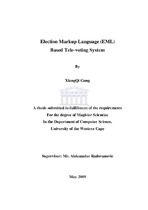| dc.contributor.advisor | Radovanovic, Aleksandar | |
| dc.contributor.author | Gong, XiangQi | |
| dc.contributor.other | Dept. of Computer Science | |
| dc.contributor.other | Faculty of Science | |
| dc.date.accessioned | 2013-07-23T11:02:42Z | |
| dc.date.available | 2012/10/23 15:40 | |
| dc.date.available | 2012/10/23 | |
| dc.date.available | 2013-07-23T11:02:42Z | |
| dc.date.issued | 2009 | |
| dc.identifier.uri | http://hdl.handle.net/11394/1707 | |
| dc.description | Magister Scientiae - MSc | en_US |
| dc.description.abstract | Elections are one of the most fundamental activities of a democratic society. As is the case in any other aspect of life, developments in technology have resulted changes in the voting procedure from using the traditional paper-based voting to voting by use of electronic means, or e-voting. E-voting involves using different forms of electronic means like; voting machines, voting via the Internet, telephone, SMS and digital interactive television. This thesis concerns voting by telephone, or televoting, it starts by giving a brief overview and evaluation of various models and technologies that are implemented within such systems. The aspects of televoting that have been investigated are technologies that provide a voice interface to the voter and conduct the voting process, namely the Election Markup Language (EML), Automated Speech Recognition (ASR) and Text-to-Speech (TTS). | en_US |
| dc.language.iso | en | en_US |
| dc.publisher | University of the Western Cape | en_US |
| dc.subject | Election Markup Language (EML) Telephone Voting System | en_US |
| dc.subject | Automatic Speech Recognition (ASR) | en_US |
| dc.subject | Text to Speech (TTS) | en_US |
| dc.subject | Voting by voice | en_US |
| dc.title | Ellection markup language (EML) based tele-voting system | en_US |
| dc.type | Thesis | en_US |
| dc.rights.holder | University of the Western Cape | en_US |
| dc.description.country | South Africa | |

